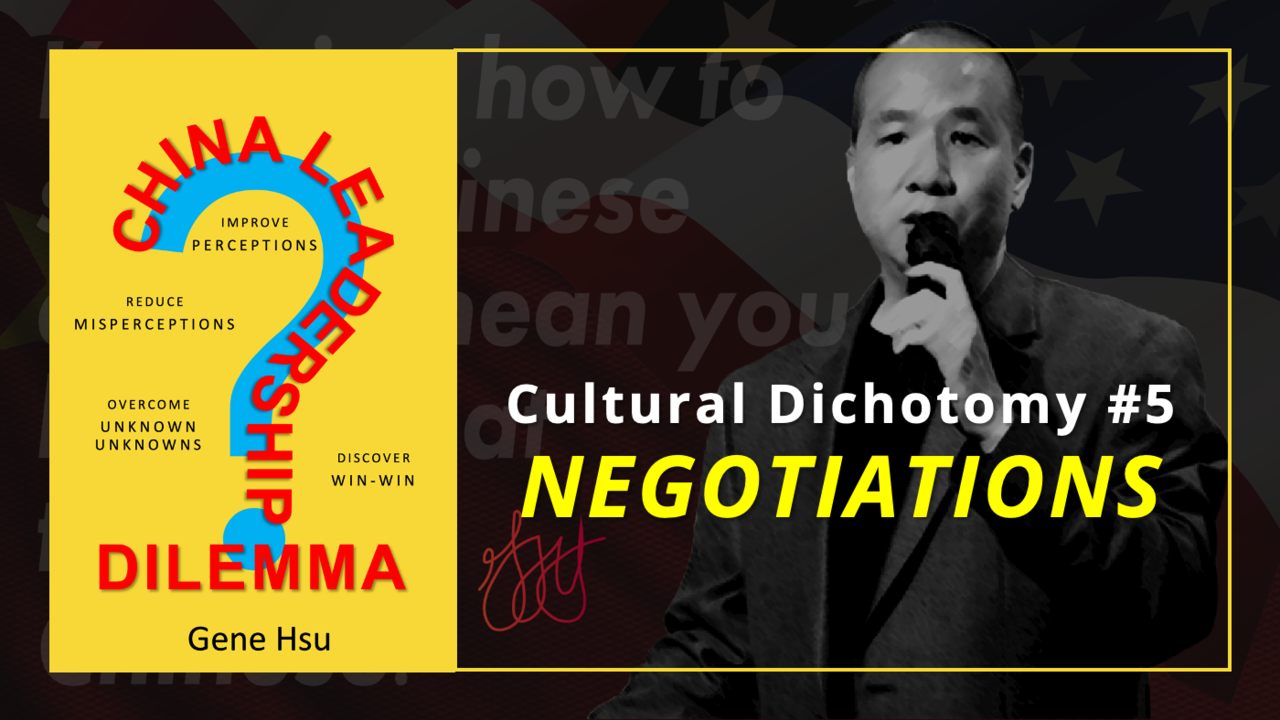Chinese-Western cultural dichotomies and their negative impact (#5: NEGOTIATIONS)
Jun 11, 2020
Is there a difference between negotiations and communications when doing business across cultures?
The healthier and more effective attitude to this answer is 'NO.'
It would be best if you communicated with the attitude that you also need to be persuasive and perceived as trustworthy…
Even when you want to announce or broadcast something to your local staff, you should pay careful attention to the cultural context of what you are saying and be aware of the need to get "buy-in" from those you are leading.
Chinese Cultural Context
- Communicate 沟通 (gōutōng)
- 沟 means a ditch, gutter, or ravine
- 通 means to connect or to go through
In order words, to communicate in Chinese only requires that a connection is made and doesn't involve any substance, understanding, or agreement. In fact, in China's hierarchical culture, to communicate generally means to issue an order that is not to be questioned or discussed.
- Negotiate 谈判 (tánpàn)
- 谈 means to discuss, chat, or socialize
- 判 means to judge, discern, or discriminate
On the other hand, to negotiate derives its meaning from a "haggling" culture that is still very pervasive in China, which is why foreigners doing business in China should develop the MINDSET that everything is negotiable, even when they believe it is not.
Cultural Dichotomy #5: NEGOTIATIONS
Beyond the etymology of the Chinese characters, the easiest way to imagine this dichotomy is to analyze the cultural context of the desired outcomes.
Westerners view the PURPOSE of negotiating is to reach an agreement and sign a legal contract. After the contract is signed, the "negotiations" are over.
Chinese believe the PURPOSE of negotiating is to increase the level of mutual trust based on reciprocity, which is to say the Chinese never stop negotiating.
To understand Chinese thinking in terms of process, imagine that for Chinese people, "negotiations" begin AFTER the contract is signed, while Westerners believe "negotiations" end after the contract is signed.
As a practical consideration for business in China, it is advisable to focus on cultivating the relationship, especially after reaching an agreement.
There are so many UNKNOWN UNKNOWNS for most foreigners that most would not even know what questions to ask on the front end, much less be able to include the necessary contingencies in the contract.
The way forward is to understand that Guanxi (关系) is the foundation for all relationships in China. As long as it is maintained, the likelihood of "bad" Chinese behavior reduced drastically.
Guanxi is the continual exchange of goodwill and reciprocity.
- Entire Keynote (The China Leadership Dilemma, Cultural Dichotomies, Live Q&A)
- Cultural Dichotomy #1: TRUTH
- Cultural Dichotomy #2: TRUST
- Cultural Dichotomy #3: FAIRNESS
- Cultural Dichotomy #4: AUTHORITY
- Cultural Dichotomy #5: NEGOTIATIONS
To learn more about The China Leadership Dilemma and/or to support my mission to reduce our cultural biases by learning to "think different" about Chinese people.
Enroll in Solving CHINA's Unknown Unknowns and learn new tactics and strategies to play and win the Chinese game in China's arena.


